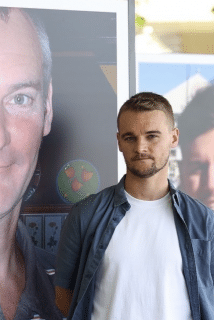Caroline Flack and our toxic relationship to celebrity
Mental Health
Mike Snelle from The Connor Brothers writes about the recent artwork they did with Caroline and why her appeal for kindness was obliterated by the machine of celebrity culture.
In late November Caroline Flack came to our studio to be photographed for a portrait she’d commissioned. She was kind, mischievous, and down-to-earth – all of the qualities that made her a relatable and a near universally liked public figure. She had a new relationship, a positive media profile, and a stellar career presenting a show that she clearly loved. She seemed happy, and with good reason. Now, less than three months later, she’s taken her own life.
The events between Caroline’s studio visit and her suicide reveal the toxic nature of our relationship to celebrity, the brutal ruthlessness of the media. Caroline was a victim of both.
Whenever the press relentlessly and remorselessly vilifies a public figure for some mistake in their personal life, past or present, the argument made is that you cannot use the press to further your career without giving up your rights to privacy in your personal life. The cost of inviting the media into your life is that you cannot pick and choose which areas they decide to cover, and how they decide to cover it. You are, the expression goes, fair game, and the press is justified in whatever they write, no matter how cruel (or untrue) the story. This is, of course, bullshit. It’s an argument that attempts to place the responsibility for the abusive actions of the press back on the victims of those actions. When The Sun this week ran a story (taken down after news of her death) mocking Caroline and featuring a drawing of her with a message saying ‘I’ll fucking lamp you’, it was presumably, in their eyes, her fault they published it because she’d chosen a career in the public eye. It’s that standard abuser’s warped logic of blaming the victim for their abusive behaviour, the tabloid equivalent of: she made me do it.
There is a fundamentally important difference between stories that are ‘in the public interest’ and stories ‘that the public are interested in’, the first being a valid justification for publication, the second being an excuse to publish just about anything, regardless of how vile, and no matter what the human cost. There is a long and lurid history of the tabloid media’s lack of basic human decency when it comes to feeding our appetite for sensationalism, from hacking the answerphone messages of murdered teenager Milly Dowler, to Piers Morgan’s relentless and repugnant coverage of Harry and Meghan’s attempt to reclaim some privacy (understandable give that lack of privacy was directly responsible for Harry’s mother’s death.) The tabloid press’ appalling bullying of Caroline should not come as a surprise to any of us, but to blame them in entirety would be to overlook an uncomfortable truth – they write what they write because we want to read it. Without our willingness to take the clickbait, they would not publish the stories. It’s our appetite for salacious gossip that creates the environment in which people are bullied, or their lives destroyed by the press, for our entertainment. A question we need to ask ourselves is why are we entertained by the public humiliation of celebrities? Why do we find pleasure in watching people’s lives and careers be destroyed?
Our obsession with celebrities means we watch their lives play out on social media and in the press like a soap opera, and like characters in a soap opera, it’s easy to believe that their emotions and problems aren’t real, in the way that ours are. The more painful and traumatic the drama, the better the entertainment. Caroline’s death shows us that celebrities are just ordinary people, their pain and distress is as real as our own, and we should treat them with the same empathy and kindness we would anyone else. This applies not only to the media, but to each of us individually as we navigate our online lives. Cruel comments on instagram, twitter or online forums, are a form of bullying, and like all bullying, they have a very real effect on the victim, even when that victim is in the public eye.
Caroline’s death feels like it was entirely avoidable and all the more tragic for it. She was a beautiful, successful, kind, and much loved young woman who was hounded to death by a press who was feeding our toxic obsession with celebrity gossip. In one of her last posts on Instagram Caroline wrote, In a world where you can be anything, be kind. Perhaps if we’d have collectively followed her advice, and demanded the press do the same, Caroline would still be here.


Join The Book of Man
Sign up to our daily newsletters for stories on mental health, masculinity and a more caring world.
Trending

Join The Book of Man
Sign up to our daily newsletters to join the frontline of the revolution in masculinity.

















